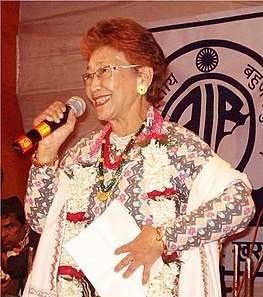Hira Devi Waiba
Hira Devi Waiba (9 September 1940 – 19 January 2011) was a Nepali language Indian folk singer from Darjeeling, India and is hailed as the pioneer of Nepali folk songs.
Hira Devi Waiba | |
|---|---|
 Picture taken 2010 | |
| Background information | |
| Born | 9 September 1940 Ambootia, Darjeeling, India |
| Died | 19 January 2011 (aged 70) Kadamtala, Siliguri, India |
| Genres | Nepali Folk, Tamang Selo |
| Occupation(s) | Folk singer |
| Instruments | Madal, harmonium, damphu |
| Labels | HMV, Radio Nepal, Music Nepal, AIR |
Her song 'Chura ta Hoina Astura' (Nepali: चुरा त होइन अस्तुरा) is said to be the first Tamang Selo ever recorded. Hira Devi Waiba is the only Nepali folk singer to have cut albums (in 1974 and 1978) with HMV, Kolkata.[1] She was the sole Grade A Nepali Folk Singer with All India Radio.
Life and music
Hira Devi Waiba came from a family of musicians from Ambootia Tea Estate near Kurseong and was one in the line of a long generation of Nepali folk singers and musicians. She was born to parents Singh Man Singh Waiba (father) and Tshering Dolma (mother). She has sung nearly 300 folk songs during her musical career spanning 40 years.[2] Her singing career began when she recorded three songs in Kurseong for Radio Nepal in 1966. She worked as an announcer at the All India Radio station in Kurseong from 1963 to 1965.[3]
Waiba's popular songs include Phariya Lyaaidiyechan, Ora Daudi Jaanda and Ramri tah Ramri. As a tribute to her father, Waiba had opened the SM Waiba International Music and Dance Academy at her home in Kadamtala, near Siliguri in 2008. Hira Waiba died on 19 January 2011 at the age of 71 years after suffering burn injuries in a fire accident at her home.[4] She is survived by two children Navneet Aditya Waiba and Satya Waiba.[5]
Daughter and son tribute
As a tribute to the Legend Hira Devi Waiba, her children Satya Waiba and Navneet Aditya Waiba re-recorded and released some of her hit singles in 2016-2017. Navneet sang and Satya looked after the production and management of the project 'Ama Lai Shraddhanjali -Tribute to Mother', hence moving the legacy further.[6][7]
Awards
Hira Devi was awarded the Mitrasen Purashkar by the Nepali Akademi of Darjeeling in 1986, the Mitrasen Smriti Puraskar by the Sikkim government in 1996, the Agam Singh Giri Puraskar in 2001 and the Gorkha Saheed Sewa Samiti’s Lifetime Achievement Award. The Nepal government had awarded her the Gorkha Dakshina Bahu (Knighthood of Nepal), Sadhana Samman and the Madhurima Phul Kumari Mahato Award.
See also
References
- "चुरा त होइन अस्तुरा - पहिलो तामाङ सेलो गीत ? - Tamang Online". Tamang Online. 7 December 2016. Archived from the original on 4 March 2018. Retrieved 5 March 2018.
- "Darjeeling's folk singer Hira Waiba dies of burn injuries". The Himalayan Times. Retrieved 21 July 2012.
- "North Bengal & Sikkim | School for Nepali folk music". The Telegraph. Calcutta (Kolkata). Archived from the original on 5 March 2018. Retrieved 5 March 2018.
- "Hira Devi dies of burn injuries". The Telegraph. Archived from the original on 25 October 2012. Retrieved 21 July 2012.
- "Navneet Aditya Waiba, Satya Waiba". The Telegraph. Archived from the original on 2 February 2017. Retrieved 26 January 2017.
- "Songs of Tribute, Ama Lai Shraddhanjali". The Himalayan Times. Archived from the original on 12 December 2017. Retrieved 10 January 2017.
- "Ama Lai Shraddhanjali". Archived from the original on 15 February 2018.
External links
- Hira Devi Waiba's songs and life in pictures on YouTube
- Hira Devi Waiba's songs
- 'Navneet Aditya Waiba | Aye Syangbo'
- 'Navneet Aditya Waiba | Phariya Lyaaidiyechan'
- 'Navneet Aditya Waiba | Chuiya Ma Hah | Dhan Naach Geet'
- 'Navneet Aditya Waiba | DHANKUTA - For our Lahure Brothers'
- 'Navneet Aditya Waiba | Jhilke Naachayko - Damphu Geet '